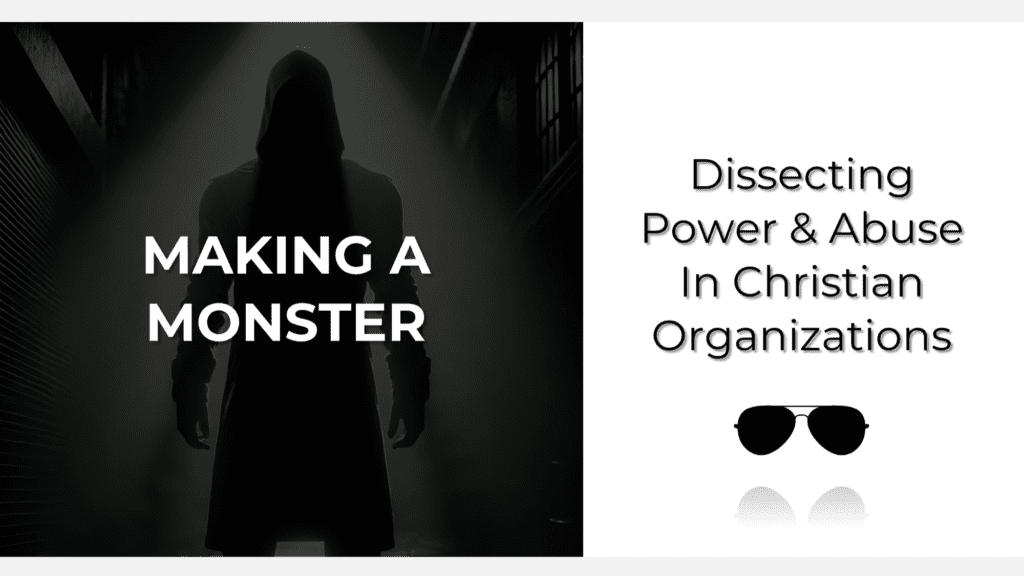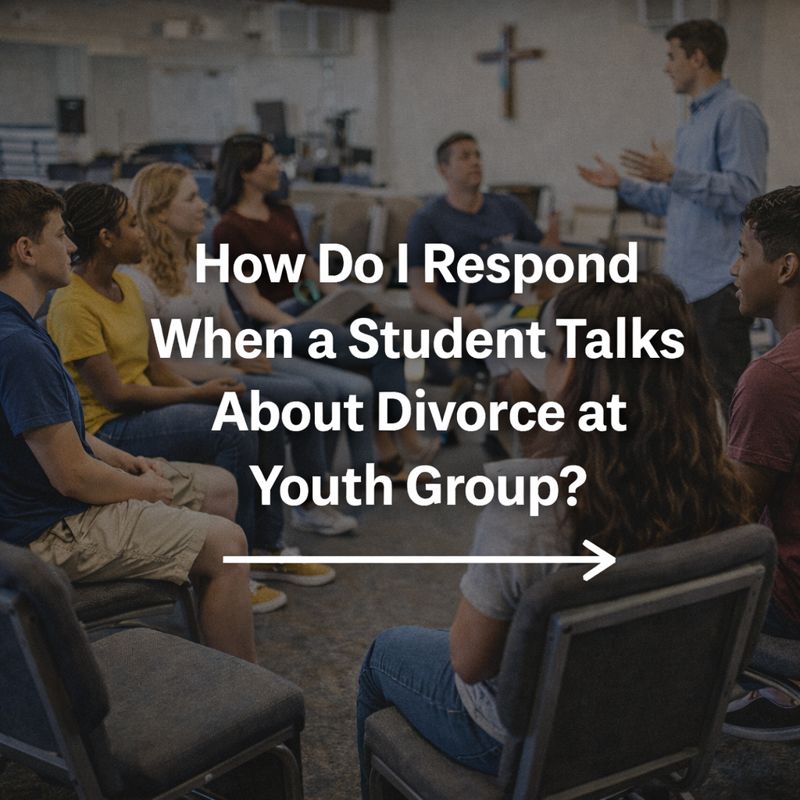
5 Tips On Caring For Youth Ministry Volunteers
It’s a fact: we could not do youth ministry or have a thriving group without our volunteers. Volunteer leaders allow

It’s easy to look back at the story after it’s already hit the news, already hurt the people, already left its mark. Another influential Christian leader. One more misuse of power. Yet again, we discover abuse in Christian organizations. And, inevitably, we see again an organization scrambling to protect the institution instead of the individuals who suffered.
This post isn’t about one person or one organization. But it is about the repeated patterns we’ve seen highlighted in Christian leadership recently. We are not uniquely in an era marred by spiritual, psychological, and sexual abuse among Christian leaders. It’s probable this is a human problem, and not a Boomer, Gen X, or Millennial problem. But the world is small, news travels fast, and our society has lost tolerance for the powerful battering those they have influence over. So this is worth talking about.
When another story of horrific abuse comes out, it’s tempting to say, “They were always a monster.” Maybe sometimes that’s true. But if we want to do a better job preventing future abuses—if we want to stop these stories from becoming so heartbreakingly familiar—we’ve got to ask a harder question:
If monsters are simply born, we have no ability to do better to prevent the things that happen. We can absolve ourselves of responsibility by brushing off the occasional monster as someone who “is just like that.” But this is not the gospel, friends. The gospel has the power to heal and save and redeem because, outside of genuine biological birth defects, nobody is “just born like that.”
We are all born into this world with a sin nature, but there is context to a monster. And while those of us reading this post don’t have the capacity to research this deeply, we do have the capacity to think, pray, and reflect on what we’ve seen and experienced and combine it with what we know God has spoken in Scripture. When we do that, we can begin dissecting the prevalence of power and abuse in Christian organizations.
Because the truth is, many of these leaders didn’t start out intending to harm. They started out wanting to do something good. Even godly. But something shifted. And we’ve got to talk about how and why.
After something horrible happens, it’s easy to assume that everything the perpetrator ever said or did was fake. That they never really cared about the mission of God or the people of God. But that’s not usually how this starts.
Many gifted, brilliant Christian leaders enter ministry because they love Jesus. They want to serve the Kingdom. They want to do it well.
But the progression of the downfall is subtle. There are many well-thought-out paradigms outlining the trajectory of abuse in organizations—Christian or non. But I want to offer one more for our consideration. It goes something like this:
At first, a gifted, brilliant Christian leaders serves the Kingdom of God. But over time, they start identifying a bit too closely with the King—maybe not Jesus, but the idea of who God is and how He should be represented. And somewhere along the way, that God becomes smaller. More defined. More rigid. And eventually, it becomes the leader’s version of God—the God they’ve boxed in and built a brand around.
Soon, they’re not just serving anymore—they’re defending. Defending their vision. Their power. Their way. So they draw lines. They exclude dissent. They decide who’s in and who’s out. And before long, the mission shifts from building the Kingdom to protecting the king: the gifted, brilliant leader.
And let’s be honest for a moment: it’s usually a king. Not always, but more often than not, it’s a male leader whose identity becomes so wrapped up in their influence that they can no longer be questioned.
And when the truth comes out, and the king can no longer be protected, the institution shifts again—now it’s the kingdom they’re protecting. The brand. The image. All of that revenue. The legacy.
And in the process, they become the exact opposite of everything they started out trying to be.
Serving the Kingdom isn’t the only motivator. Most of us also want to matter. We want to be significant. And that’s not wrong—it’s human. In fact, there’s a part of me that shrivels inside of myself just writing this, because I feel this very pull deeply within the core of my being. But for gifted, brilliant leaders, the scope of that desire is often huge.
They want to be influential. They want to shape things. These leaders want to lead the conversation. Influence itself isn’t evil. A desire for influence isn’t evil, either. But let’s be honest. Influence and power give a person the ability to do more—for better or worse.
When you’re influential, people bend the rules to stay in your orbit. When you’re powerful, people give you the benefit of the doubt. And when you’re good on stage, people are more likely to overlook what happens behind closed doors.
Even if a leader doesn’t set out to manipulate or abuse, influence creates opportunities for compromise. And if nobody’s checking that power—if nobody’s telling them no—it creates a vacuum where monsters can be made.
There’s nothing inherently wrong with Christian leaders earning a living. Most of us are trying to provide for families, plan for the future, and stay afloat in a world that isn’t getting cheaper.
But there’s a difference between making a living and loving money.
And when financial success becomes tied to a leader’s platform or persona, things get murky. Especially when that money starts flowing not just from books or speaking gigs—but from a ministry that was supposed to exist for the people it serves.
Once the money is tied to maintaining the image of a leader—or the secrecy of an inner circle—it’s nearly impossible to stay transparent. That’s how abuse gets buried. That’s how NDAs and non-competes get signed. It’s how voices get silenced.
And, while we’re on the topic, let me just say that non-competes have absolutely no place in the Church—whether a local church or Christian resourcing organization. At the heart of a non-compete agreement is a willingness to shackle amazing, skilled people out of fear that the sandbox of the Kingdom isn’t big enough for all of us to play in. It’s rooted not in trust in God and love for one another as the New Commandment instructs, but in a poverty mindset and a belief that if one organization can’t be the sole source of gospel encouragement to a broken world, then nobody should. To claim to be a gospel-centered organization while forcing your employees into non-compete agreements is completely hypocritical. And it highlights exactly why Paul told the young, gifted, brilliant leader Timothy that the love of money is the root of all evil.
But before I start to sound too high and mighty, let me ground all of us with an inescapable reality. The truth is, sin affects everybody. We know that. We really do. Each and every one of us teaches it on a weekly basis in our youth groups. And each of us knows it from our own personal life experience. Sin is universal. Nobody escapes its grasp. The human condition is pervasive.
That doesn’t give one human being a right to abuse another. Sin, especially sin that intentionally and cruelly harms and manipulates someone Jesus died for, is atrocious to the nth degree. But it is because sin is a universal sickness—and nobody is immune—that we need to sprint from the trajectory laid out in this blog post.
When serve the Kingdom starts shifting into serve the King, we ought to press pause. There’s nothing wrong with clarifying your theology. It’s good to pursue greater clarity on who God is and what He is for. But whenever a Christian organization begins drawing hard lines in the sand—or no lines at all, which is its own kind of line—we should pause.
It doesn’t mean stop. It doesn’t mean shut it down. And it most certainly doesn’t mean the leader of that organization is secretly committing some monstrous atrocity. But we’ve played these games before. We know where they lead. And that means it’s on us to slow down when the trajectory starts to shift—to ask questions, to seek counsel, to hold each other accountable. Because while serving the King is still good and right and holy, without guardrails it can quickly devolve into “protect the King” and then “protect the king.”
Both as outsiders looking in and insiders trying to build something beautiful, we should never be afraid to pause and examine the path we’re walking. If we can’t and won’t, then stories like the one that came out recently are likely to just keep coming.
People become abusers for a thousand different reasons. But if we zoom out, these three motivators—Kingdom service, influence, and wealth—are common denominators. And they don’t play well together.
We’ve experienced a fresh wave of abuse in Christian organizations in recent years, and it’s been devastating. I think each and every one of us loves the Church. We believe in Christ’s bride. That’s why we do what we do. So within each and every one of us, there is likely a small voice that wants to defend the Church—to prove that she’s not broken. To highlight that the atrocities we read about and hear about aren’t overwhelmingly common. The statistics are still generally positive.
But…the thing is…the stories of verbal, psychological, and sexual abuse aren’t just statistics. They’re people. People who were harmed in places that were supposed to be safe.
But we have a chance to do better. To create something different. To value character over charisma. We have a chance to prioritize soul care over stage presence. To pursue the gospel—not just in what we preach, but in how we lead. It starts with each and every one of us. Myself included as the leader of a young Christian resourcing organization.
At G Shades, we believe in seeing everything—everything—through the lens of the gospel. That includes youth ministry curriculum, yes. But it also includes leadership culture. Accountability. Integrity. Human dignity.
We’re not just trying to build a great product. We’re trying to build a gospel-shaped team. One that loves each other well, elevates truth, and fights hard to be excellent without ever sacrificing our people on the altar of progress.
Because we’ve seen what happens when organizations lose sight of the gospel. And we’re committed to a different path.
If you’re hungry for more, there are voices far better than mine to speak into this and move the ball forward. I can’t speak to absolutely everything these folks do, say, or believe, but I know they’re getting it right right now when it comes to preventing abuse and caring for the victims of it in the aftermath:
@daniellejstrickland on Instagram. Danielle Strickland is a big-time justice advocate and incredible speaker and leader. Her voice is to be heard and respected.
@elllllllllllllllllle on Instagram. Despite having the most whimsical handle in the world (that’s 15 L’s, by the way), Elle Campbell’s words are to be taken quite seriously. She is an unbelievably bright influence in the Christian resourcing space, and speaks with authority frequently on the subject of abuse and power dynamics.
hagarsvoice.com. Hagar’s Voice exists to strategically support survivors of sexual abuse within Christian circles. Visit their website to read their story and donate to their incredible cause.
If you’ve ever felt discouraged by the leadership failures in Christian spaces—or if you’re just trying to do it right in your corner of the world—we’re with you.
Let’s keep building something better.

It’s a fact: we could not do youth ministry or have a thriving group without our volunteers. Volunteer leaders allow

If you’ve been in youth ministry longer than a few years, you’ve had a student bring up divorce at youth

Every single youth leader has felt this tension before: students on their phones during youth group. You work hard to